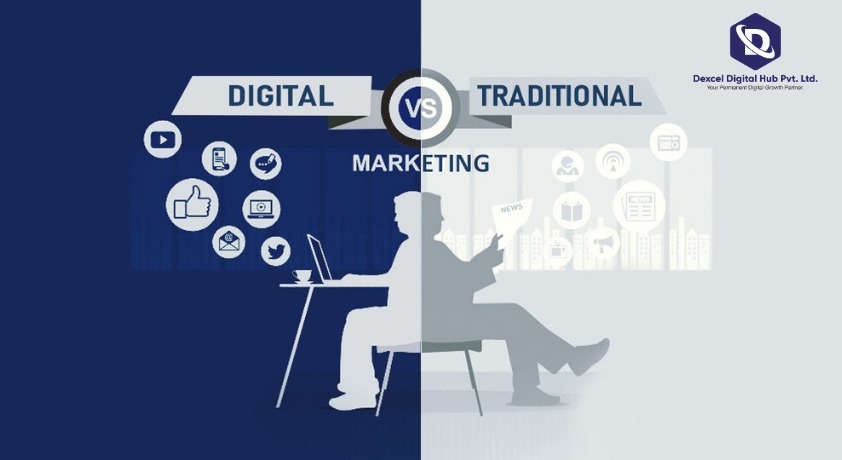
In today's increasingly digital world, businesses have a wide range of marketing channels and strategies to choose from. While traditional marketing methods such as print ads, billboards, and TV commercials have long been staples of the marketing world, digital marketing has revolutionized how businesses connect with their target audiences.
With so many options available, it's important to understand the key differences between digital and traditional marketing to determine which approach is best for your business. In this blog post, we'll take a deep dive into the fundamental differences between digital and traditional marketing and help you better understand each approach's unique benefits and drawbacks.
Whether you're a seasoned marketer or just starting, this post will provide valuable insights to help you make informed decisions about your marketing strategy.
Digital Marketing Vs. Traditional Marketing
| Aspect | Digital Marketing | Traditional Marketing |
| Reach | Global | Local/Regional |
| Targeting | Precise | Broad |
| Cost | Flexible | Fixed |
| Measurement | Trackable | Hard to measure |
| Interactivity | High | Low |
| Engagement | Interactive | Passive |
| Flexibility | Adaptable | Rigid |
| Campaign Duration | Adjustable | Fixed |
| Content | Diverse | Limited |
| Audience | Wide range | Limited |
| Branding | Customizable | Limited control |
| Examples of Channels | Social media, email marketing, SEO, PPC, content marketing | TV ads, print ads, billboards, radio ads, direct mailers. |
Please note that the above table provides a general overview and that the specific characteristics of digital and traditional marketing may vary depending on the industry, target audience, and marketing goals. It's important to consider your business's unique needs and goals carefully when determining the most effective marketing strategy.
First, Those Who Don't Know, Let's First Understand About Digital Marketing & Traditional Marketing
Traditional Marketing
Traditional marketing refers to the conventional forms of advertising and promotion that have been used by businesses for decades. This includes marketing channels such as television commercials, radio ads, print advertisements, billboards, direct mail, and telemarketing.
Traditional marketing strategies aim to reach a wide audience through mass media, with a focus on promoting the features and benefits of a product or service to generate sales.
While traditional marketing can still be effective, it is often more costly and less targeted than digital marketing and may not provide the same level of measurable results.
Digital Marketing
Digital marketing encompasses all marketing efforts that utilize digital channels, such as search engines, social media, email, websites, and mobile apps, to connect with current and potential customers.
Unlike traditional marketing, digital marketing allows businesses to target specific audiences with precision, track their engagement and measure the success of their marketing campaigns in real time.
Digital marketing strategies include Search Engine Optimization (SEO), Pay-Per-Click (PPC) advertising, content marketing, social media marketing, email marketing, and many others.
With the growth of the internet and mobile usage, digital marketing has become increasingly important for businesses of all sizes to reach and engage with their customers effectively.
What is the Key Advantage of Digital Marketing Over Traditional Marketing?
Digital marketing has become an increasingly popular way for businesses to connect with customers and promote their products or services. While traditional marketing methods such as television ads, print advertisements, and billboards still have a place in the marketing world, digital marketing has several advantages that make it a more effective and efficient way to reach a targeted audience.
The main advantage of digital marketing is its ability to target a specific audience. Unlike traditional marketing methods, digital marketing allows businesses to reach a highly targeted audience based on age, gender, location, interests, and online behaviour.
This is possible through various digital marketing strategies, such as PPC advertising, social media marketing, and email marketing, which allow businesses to create and deliver customized messages to their target audience.
For example, consider a company that sells sports equipment. With traditional marketing methods, the company may create a TV commercial that airs during a sports game. While this will reach a large audience, not all of those viewers will be interested in sports equipment.
With digital marketing, the company can target individuals who have previously shown an interest in sports equipment through online behaviour, such as searching for sports gear on Google or following sports-related accounts on social media.
This targeted approach ensures that the company's marketing efforts are being directed to people who are most likely to be interested in their products, resulting in higher engagement and better conversion rates.
Another advantage of digital marketing is its ability to measure and analyze the effectiveness of marketing campaigns in real time. Unlike traditional marketing, which can be difficult to track and measure, digital marketing provides businesses with detailed analytics on how their campaigns are performing.
This includes information on how many people are viewing their ads, how many are clicking through to their website, and how many are converting into customers.
This data allows businesses to make informed decisions about their marketing efforts, such as adjusting their target audience, refining their messaging, or allocating more resources to a specific channel.
The key advantage of digital marketing over traditional marketing is its ability to target a specific audience and provide measurable results. Using digital marketing strategies, businesses can reach the right people with the right message, leading to higher engagement and conversion rates.
Additionally, the ability to measure and analyze the effectiveness of marketing campaigns in real time allows businesses to make data-driven decisions and optimize their marketing efforts for better results.
Which Type of Marketing Should You Use? Digital Marketing or Traditional Marketing?
Deciding whether to use digital marketing or traditional marketing depends on several factors, including your target audience, budget, and business goals. Each type of marketing has its advantages and disadvantages, and the most effective marketing strategy will depend on your specific needs.
Here are a few things to consider when deciding which type of marketing to use:
- Target audience: Consider the demographics and behaviour of your target audience. If your audience is predominantly online and active on social media, digital marketing may be the better option. However, if your audience is less tech-savvy and prefers more traditional media, such as newspapers and radio, then traditional marketing may be more effective.
- Budget: Digital marketing can be more cost-effective than traditional marketing, especially for small businesses with limited budgets. However, depending on the type of digital marketing strategy, costs can vary. For example, pay-per-click advertising can be expensive if you target highly competitive keywords, while social media marketing can be more affordable.
- Business goals: Consider your overall business goals and how your marketing strategy aligns. If you aim to increase brand awareness and reach a large audience, traditional marketing may be more effective. However, if your goal is to generate leads or increase website traffic, then digital marketing may be the better option.
- Measurability: Digital marketing provides more accurate and measurable data on the success of your campaigns compared to traditional marketing. Digital marketing tools allow you to track website traffic, engagement rates, and conversion rates, providing insight into how your marketing efforts are performing. This data can be used to make informed decisions on refining and optimizing your marketing campaigns.
There is no one-size-fits-all answer when choosing between digital marketing and traditional marketing. It ultimately depends on your target audience, budget, business goals, and the type of marketing campaign you are running. A well-rounded marketing strategy could incorporate digital and traditional methods, depending on your unique needs and goals.
Final Words
Digital and traditional marketing have different approaches to reaching and engaging with customers. While traditional marketing has been the standard for decades, digital marketing has emerged as a powerful and more effective way for businesses to connect with their audience.
Digital marketing allows for precise targeting, real-time measurement, and a more personalized approach that can be adapted and optimized quickly.
On the other hand, traditional marketing still holds a place in marketing strategies, especially for businesses targeting a broader audience or reaching people who may not have access to digital devices.
Some traditional marketing methods, such as billboards and television ads, can still be effective in raising brand awareness and building a brand reputation.
Ultimately, the most effective marketing strategy will depend on your business goals, target audience, and budget. A well-rounded marketing strategy can incorporate digital and traditional methods, depending on your unique needs and goals.
The key is to continually evaluate and optimize your marketing efforts to ensure that you are reaching and engaging with your target audience effectively. For digital marketing, you can contact us. We are a reliable and professional agency that can help businesses achieve their marketing goals.




